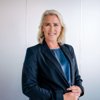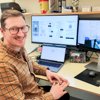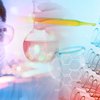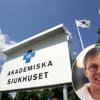Fritextsökning
Artiklar per år
Innehållstyper
-

Siemens köper forskningsplattform inom läkemedel för 51 miljarder
Siemens AG tar ett rejält kliv in på life science-området genom att förvärva amerikanska Dotmatics och dess forskningsplattform i en affär på 5,1 miljarder dollar, motsvarande 51 miljarder kronor.
-

Bico säljer bolag inom in vitro-testning och digital patologi
Bioteknikbolaget Bico avyttrar Mattek och Visikol, som integrerades i Mattek operationellt förra året, till Sartorius Lab. Köpeskillingen är på 80 miljoner dollar, motsvarande 807 miljoner kronor, på kassa- och skuldfri basis.
-

Kry i stort ordbråk med regionen – ”Helt dysfunktionell byråkrati”
Nyligen hävde Region Skåne avtalet med Krys barnmorskemottagning i Malmö. På Linkedin slår Kry tillbaka mot kritiken i ett långt och ofiltrerat inlägg, som börjar med ordet ”Suck!”.
-

An organ seldom in the spotlight – but utterly vital
The kidneys consist of more than 40 types of cells and have more functions in the body than most people know. Julie Williams leads AstraZeneca’s work in preclinical research about kidney diseases. “They are probably one of the most complicated organs in the body, and I like a challenge”, she says.
-

Aqilion's licensing journey: From Merck partnership to new opportunities
Be extremely meticulous with your scientific data, but spend just as much time and effort on business development. That piece of advice comes from Aqilion's CEO Sarah Fredriksson and is directed at biotech companies aiming to find a good licensing partner.
-

A tiny animal with great importance
From the mythical Ganges River to the less sacred, but considerably cleaner waters in KI's aquariums in Solna. The little zebrafish has made an unconscious career – as an increasingly important model organism in medical research.
-

Who pays for Rebecca Doe – and all of us?
Anna Törner on how easily we get used to the idea that healthcare is free - when it really is about how and who pays for it
-

The art of successful licensing – “A lot has to align”
Sharp research, strong data and a high level of innovation are all very good, but more than that is required to achieve the goal of many biotechnology companies: to succeed with a licensing deal.
-

Ukraine war fuels rise of totally resistent bacteria
War-torn Ukraine is not just suffering from hostile attacks from a foreign aggressor, but also from the threat of a totally resistant and contagious bacteria.
-

Anna Hellergård blir ny vd för Attana
Attana, som arbetar för att effektivisera utvecklingen av nya läkemedel, har utsett Anna Hellergård till ny vd med tillträde 1 april. Det framgår av ett pressmeddelande.
-

Security flaw in Swedish breast cancer screening software – woman passed away
A lack of safeguard in Sectra's software led to a woman with breast cancer receiving an incorrect diagnosis. She later passed away. The software is used in 20 out of 21 regions in Sweden. It is also used in neighbouring Nordic countries. “Extremely serious,” says the Sectra CEO to Medtech Magazine.
-

Health politician Lina Nordquist: ”I find it hard to be idle”
She is the pharmacist and researcher who grew tired of the breakthroughs that never materialised and knowledge that never seemed to reach patients, so she decided to make a change from within. Life Science Sweden meets Lina Nordquist, Member of Parliament for the Liberals and their spokesperson on healthcare policy, to have a conversation about reality, politics, and the need for writing.
-

AI detects tumor disease – via voice recording
A short voice recording along with facial images – both analyzed with an AI algorithm – can make it possible to detect the rare tumour disease acromegaly and initiate treatment at an early stage.
-

Anna Törner: Vem betalar för Rebecca Doe – och alla oss andra?
Det lätt att vänja sig vid tanken att vård och läkemedel är gratis, när det egentligen handlar om hur och vem som betalar. Det skriver Anna Törner i en krönika.
-

We desire talent to come here, but are we genuinely welcoming them?
Sweden faces significant challenges in creating a truly inclusive environment that makes international professionals feel welcome, valued, and able to build meaningful careers, writes Sarah Lidé in a column.
-

Digitala tvillingar blir verklighet i primärvården – ”Som en tamagotchi”
Att möta sin egen digitala tvilling och se vad som händer med kroppen om man slutar röka eller ändrar diet? Det ska testas vid besök på vårdcentraler i Östergötland.
-

The business coach: “We need to learn from our mistakes”
The past year has been challenging for many biotech companies, with several comapanies facing financial stress and bankruptcy. To understand how entrepreneurs can navigate these tough times, Life Science Sweden spoke to Pia Keyser, a business coach at Umeå Biotech Incubator, who has worked with many companies in the industry.
-

AI upptäcker tumörsjukdom – via röstinspelning
En kort röstinspelning tillsammans med ansiktsbilder – i bägge fallen analyserade med en AI-algoritm – kan göra det möjligt att upptäcka den sällsynta tumörsjukdomen akromegali och sätta in behandling i ett tidigt skede.
-

Sensorer som lossnar och buggar i appar – fler klagomål på medicinteknik
Läkemedelsverkets nya e-tjänst för anmälan av problem med medicintekniska produkter har lett till en markant ökning av rapporter från privatpersoner. Särskilt många av anmälningarna gäller produkter för personer med diabetes.
-

The future of healthcare in focus: ”Together, things happen”
In march, it’s once again time for Fokus Patient, an event for the industry where the patients’ perspective takes center stage. It’s a great way to spread knowledge in Sweden and around the world, according to the initiator Penilla Gunther
-

16 miljoner kronor till ATMP i Västsverige
Genom en miljonsatsning i Västra Götalandsregionen ska små och medelstora life sciene-bolag få stöd för att accelerera utvecklingen inom avancerade terapiläkemedel (ATMP).
-

New cell therapy raises hope for curing type 1 diabetes – "Never succeeded before"
For the first time, a patient with type 1 diabetes has undergone an islet transplantation using genetically modified insulin-producing cells that do not require immunosuppressive drugs. "A major immunological breakthrough," says Professor Per-Ola Carlsson, who leads the clinical study, to Life Science Sweden.